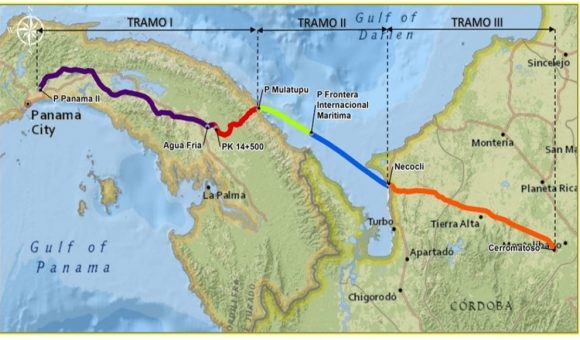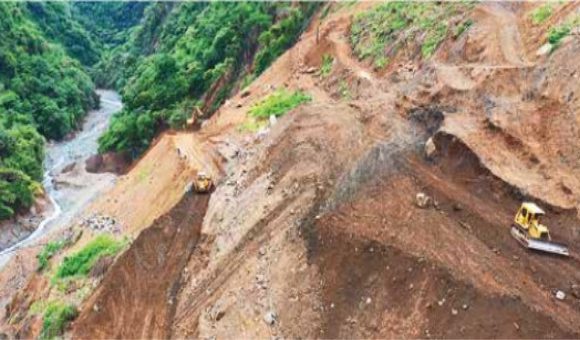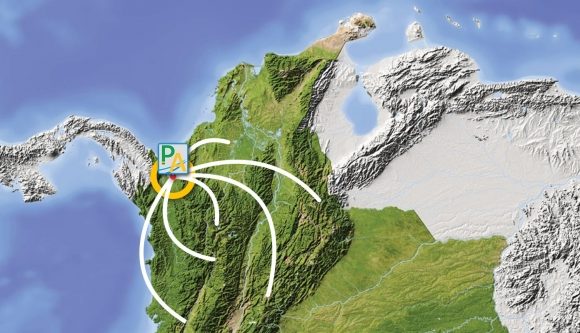Cemex Renews Cement/Concrete Operations; Antioquia Highway Projects to Restart

Cemex Colombia revealed in an April 13 filing with Colombia’s Superfinanciera corporate oversight agency that it has just restarted all cement/concrete production and dispatch operations — thanks to certain Coronavirus quarantine-exemptions newly issued by the national government this month.
“In particular, from April 13 to April 27, 2020, in accordance with the provisions of the exceptions contained in [government Decree 531], Cemex Colombia will supply construction materials and supplies for the execution of permitted civil works, such as transport infrastructure works and public works (which are generally established as a new exception), those related to emergency care and road damage, and infrastructure works that cannot be suspended, civil and construction works that their state of progress of work or its characteristics present risks of technical stability and works related to the production of food, medicines and essential elements necessary to deal with the Covid-19 pandemic, among others,” according to the Cemex filing statement.
Among the currently exempted-from-quarantine construction projects: the giant “Rio Magdalena Bridge” at Puerto Berrio, Antioquia, according to Agencia Nacional de Infraestructura (ANI, the national infrastructure development agency).
“This mega-work has an extension of 1.36 kilometers and crosses the Magdalena River to connect the departments of Antioquia and Santander,” according to ANI.
This bridge – part of the 144-kilometers-long “Magdalena 2” highway project by the “Río Magdalena SAS Highway Concession” – is “recognized as one of the most emblematic works of Colombian infrastructure by the ANI and is already 90% complete,” according to ANI.
Continuation of construction is required because “abrupt stopping of the execution of this type of structure would generate risks in its stability,” according to ANI.
“In total, this mega-project consists of four functional units which will connect the municipalities of Remedios, Vegachí, Yalí, Yolombó, Maceo and Puerto Berrío in Antioquia, and Cimitarra in Santander,” ANI added.
Antioquia Government Coordinating Highway Construction Restarts
On a related front, the Antioquia departmental government announced April 13 that — because of the new national government decree allowing crucial infrastructure projects to continue if the projects also meet new biosafety rules — “departments and municipalities will begin to normalize or regulate how these procedures” will be put into effect.
Antioquia’s Secretary of Infrastructure added that “to date, 19 paving projects have been detained, 41 projects halted in the area of public services, and another 150 projects related to the municipal or tertiary road network” were stalled by the Coronavirus quarantine under prior government rules.
However, even with the new, more-flexible rules, any project construction only would restart “after a conversation with the mayor where it is being carried out,” according to Antioquia Infrastructure Secretary Juan Pablo López Cortés.
For example: Restart of work on the crucial “Toyo Tunnel” that eventually will connect Medellin to Atlantic ports via the “Mar 1” and “Mar 2” highways would get the green light only following compliance with new Ministry of Health protective measures for workers, as well as consultations with local mayors, he added.
“A ‘Works Reactivation Committee’ has been created in the Antioquia Infrastructure Secretariat, including Covid-19 [prevention measures] and which also includes the Health Secretariat,” López said.
“This committee will evaluate each individual work project, as each contractor will send its biosanitary protocols and its start-up plan to the Ministry of Health.
“Once it is found that these [biosanitary] protocols are being complied with, and that the audits of the works show compliance with the ARL [Colombia’s workers-compensation regime], and that contractors are able to restart works, then, following agreement with each of the Mayors, a decision will be made about reactivation of the works– or at least on some of their fronts,” according to Secretary López.
The Antioquia Departmental government and local mayors likewise will coordinate with the Ministry of Health on biosafety-rule compliance for the “fourth-generation” (4G) major highway projects overseen by the ANI, he added.
The Ministry of Health has issued “circulars with very detailed manuals for each of the functions or operations to be carried out, such as the transportation of workers, the protection and safety elements that must be employed [and] daily reports of the health status of said workers,” according to Secretary López.
“In addition to this, the Antioquia Department will have an external audit team accompanying the Ministry of Health to follow these projects, their supplier chains and subcontractors, in order to assess that everything is in compliance — or if otherwise, then sanctioning actions” will be imposed.
















